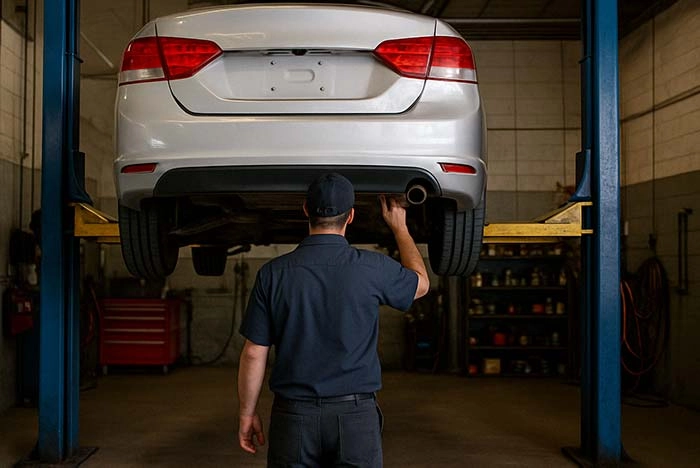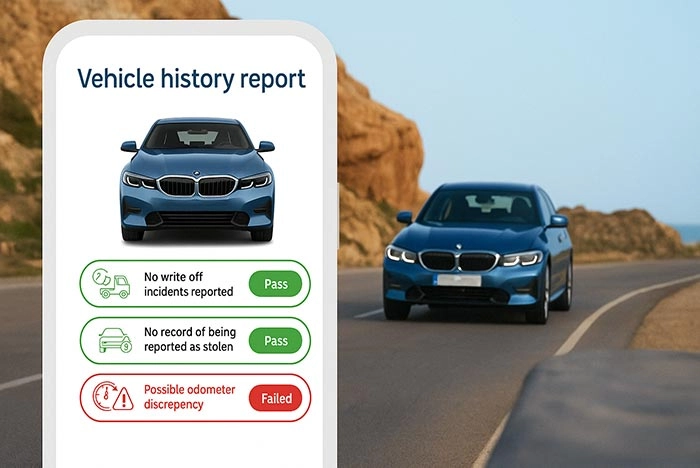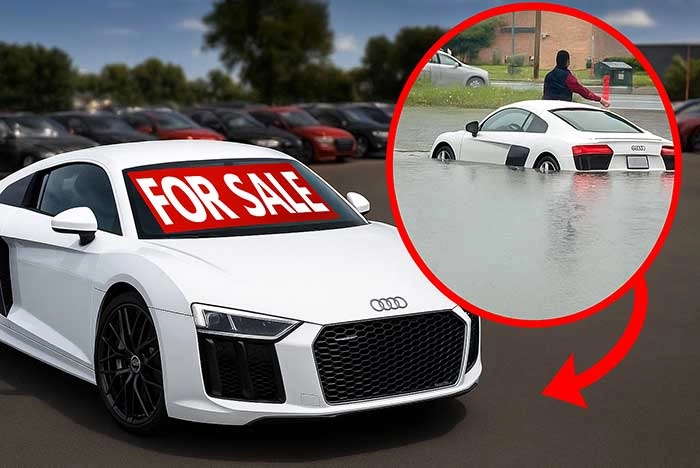
Pre-Purchase Car Inspection – Cost, Process & Where to Get One
The Importance of a Pre Purchase Inspection by a Mechanic
Usually buying a second hand car can be a smart financial decision, but it comes with its own set of risks. Many of the used cars on the market may have some issues where you cannot find with the Vehicle History Report and aren't obvious during a casual walk-around or even a test drive. So, this is the where PPI pre-purchase inspection by mechanical can be beneficial. What a pre-purchase inspection is? It is a detailed examination of the car's and aesthetic condition, helping buyers avoid surprises like costly repairs or safety hazards down the road.
We will explain what a pre-purchase inspection is, why it’s an essential step before purchasing any used vehicle, and how to go about scheduling one. We’ll cover how to find a reliable mechanic, where to take the car for inspection, and what the inspection typically includes. Additionally, we’ll discuss whether the investment is worth it and answer common questions like how much does a pre-purchase inspection cost and can you take a used car to a mechanic before buying?
What is a Pre-Purchase Inspection and Why is it Important?
A pre-purchased inspection (PPI) is a professional evaluation of an used car's mechanical, structural, an aesthetical condition before a buyer commits to purchasing it. This is usually done by a certified mechanic or inspection service, who examine the vehicle's component and systems to evaluate if there are underlying issues that might be not obvious from the first impression.
The goal of the PPI is to provide the buyer with an accurate, detailed report on the car’s current state, and help them make an informed decision.
Why is a Pre-Purchase Inspection Important?
Many cars on the market may have hidden issues, ranging from minor issues like worn-out brake pads to major defects like engine failure, transmission issues, or frame damage due to previous accidents.
For example, the National Highway Traffic Safety Administration (NHTSA) estimates that around nearly 40% of used vehicles on the market are not at top condition, either they have some defect or they need repair. Even further context examines that between 2010 and 2018, automakers in the U.S. only issued recalls for 238 million cars and light trucks because of unsafe defects. The most dramatic, about 25% of these vehicles was never repaired.
So, if you skip a PPI you might end up with a Deathtraps, without you realizing it.
Risks of Skipping a Pre-Purchase Inspection
- Hidden Mechanical Problems: Some issues, like worn-out components or engine problems, might not be noticeable until you’ve driven the car for several hundred miles. These can lead to expensive repairs and even compromise your safety.
- Undisclosed Accidents: A used car may have been involved in a collision that wasn’t properly repaired or disclosed by the seller. Frame damage or subpar repairs can reduce the car’s safety and value, something only a professional can spot.
- Financial Burden: Without a pre-purchase inspection, buyers risk facing costly repairs soon after purchase. An inexpensive used car might turn into a money pit, with repair bills that far exceed the initial price.
How to Get a Pre-Purchase Inspection
By following some basic steps, you can ensure that the vehicle you want to purchase is examined by a good mechanic. Here's a guide on how to get a pre-purchase inspection and some best practices to make sure everything goes smoothly.
- Research Local Mechanics or Inspection Services First thing is to find a trusted mechanic or some pre-purchase inspections services. The mechanic will be less expensive, but you should make sure that he knows what to look for and especially have some experience with the make of the vehicle. That is important because every make and model has some weak links, and it is better if they are examine. Second, the PPI service those can be found online, they will give you more detailed report but it will be costly. TIP: While some sellers might offer to take the car to the mechanic themselves, it’s recommended that you, the buyer, be present for the inspection. You can ask questions and hear the mechanic observation.
- Consider Online Platforms If you have trouble finding a good mechanic, look for online platforms like YourMechanic or LemonSquad allow you to book an inspection online. These are example in the US market, but there such services all around the world.
- Schedule the Inspection Early It’s important to arrange the inspection before finalizing any deal. Ideally, you should schedule the inspection as soon as you’ve found a car you’re seriously considering. This will give you time to review the mechanic’s findings before committing to the purchase.
- Communicate with the Seller Once you’ve booked the inspection, inform the seller. If the car is being sold by a dealership, they may already have an inspection process, but it’s always a good idea to have your own independent inspection. For private sales, the seller should be cooperative and allow the mechanic access to the car.
- Review the Mechanic’s Report After the inspection, the mechanic will provide a detailed report on the car's condition. The report should highlight any potential issues, needed repairs, and whether the car is in good condition overall. You can use this report to negotiate with the seller, request repairs, or decide to walk away if the car has significant problems.
What Does a Pre-Purchase Inspection Include?
The perfect pre-purchase inspection (PPI) consist of a detailed evaluating on the car's condition, covering a range of components to ensure that the vehicle is in good working condition. Here is a detailed breakdown of what a pre-purchased inspection includes, mainly areas that mechanics evaluate in order to formulate a full picture of the vehicle condition.
Key Areas Inspected During a Pre-Purchase Inspection
- Engine
- Oil leaks or signs of burning oil
- Unusual noises such as knocking, rattling, or ticking that may indicate timing chain problem or rod bearing wear.
- Engine performance during idle and acceleration, the engine is not hesitant or there are no misfires.
- Visual inspection for worn belts, hoes, or electrical problems
- Fluid levels and quality: The mechanic checks the condition of the oil, coolant, and other fluids to ensure proper maintenance.
- Transmission
- Fluid leaks usually around the transmission(these leas could be very common)
- Shifting quality Whether the car is automatic or manual, the mechanic will check for smooth and responsive gear changes.
- Delayed Shifting or slippage, that could indicate bad transmission clutch or bad computer, not a cheap parts to repair
- Unusual sounds such as grinding or clunking, which may indicate transmission wear or damage.
- Brakes and Suspension
- Brake Discs, Pads and Rotors check how much break pads are left also the Brake Disc if they have big lip, and how the responsive are the Rotors.
- Suspension check the shock absorbers, bushings and struts.
- Alignment if the car properly aligned
- Electrical System
- Battery check battery voltage and how old is it
- Starter and Alternator check the starter if it is worn, and the Alternator if it is charging the battery while running.
- Wiring, Fuses, and Connectors signs of wear, corrosion, or damage.
- Lights, Wipers, Power Windows, Locks or other accessories.
- Body And Frame Condition
- Frame check for uneven lines between the panels, that can indicate that the vehicle had an accident.
- Rust all over the frame under the car especially in areas like the undercarriage, wheel wells, and around doors. The rust can be very nasty, and extremely difficult to deal with.
- Paint Condition usually the mechanic should have a pain meter it measure how many layers of paint the panel has, if the pain it to thick it may indicate that it was repainted.
- Tires if they are worn and how much they could be driven.
- Diagnostic Scan
- Most modern cars (After 2000) have an onboarding diagnostic that stores error codes when something is wrong with the car. This is particularly useful identifying problems with the engine, transmission, or the emission system.
- Road Test
- A road test is often part of the pre-purchase inspection and allows the mechanic to assess how the car performs under real driving conditions.
Why a Comprehensive Pre-Purchase Inspection is Important
By evaluating all these components, a pre-purchase inspection provides an in-depth look at the car’s current condition. Even if a car appears to be in good shape on the surface, the mechanic’s inspection might reveal underlying problems that could turn into expensive repairs later.
How Much Does a Pre-Purchase Inspection Cost?
The cost of pre-purchase inspection (PPI) can vary depending of several factors such as the location, the the complexity of the inspection, and the mechanic or service provider you choose.
- Standard Inspection Most basic PPI generally cost between 150$ and 250$. Usually these inspections cover the most essential checks like engine, transmission, brakes, and suspension and it take about 1-2 hours.
- Comprehensive Inspection with Diagnostic. These are more complex inspections and can range between 200$ to 300$ or more. A more detailed or comprehensive inspection typically includes everything in a basic inspection, along with more in-depth diagnostic testing and it can take longer.
- Regional Variations. PPI costs can vary significantly based geographic location. Urban areas tend to have higher prices compared to rural regions. For instance, in some areas, basic inspections might start around $100, while more detailed evaluations could go up to $300
- Negotiation Tips: Buyers and sellers often split the cost of the inspection, making it more affordable for both parties. This can reduce individual costs to between $75 and $125 each
FAQs Section
What Should I Ask a Mechanic Before a Pre-Purchase Inspection?
- What will the inspection cover?
- Do you include a diagnostic scan to check for hidden issues?
- How much experience do you have with this make/model?
- Can I be present during the inspection?
How Long Does a Pre-Purchase Inspection Take? A pre-purchase inspection typically takes between 1 to 2 hours. Basic inspections are quicker, while comprehensive ones with diagnostic scans and road tests may take longer
Do All Mechanics Perform Pre-Purchase Inspections? No, not all mechanics offer pre-purchase inspections. It’s important to confirm with the mechanic in advance that they provide this service and have the expertise for thorough evaluations.
Can I Negotiate a Car’s Price Based on the Inspection Results? Yes, if the inspection reveals issues, you can use this information to negotiate a lower price or request that the seller address the problems before finalizing the purchase.
Can I Do a Pre-Purchase Inspection on My Own? While you can perform a basic check (e.g., looking for visible damage or testing the brakes), it’s highly recommended to have a professional mechanic conduct a thorough inspection to uncover hidden issues you might miss

